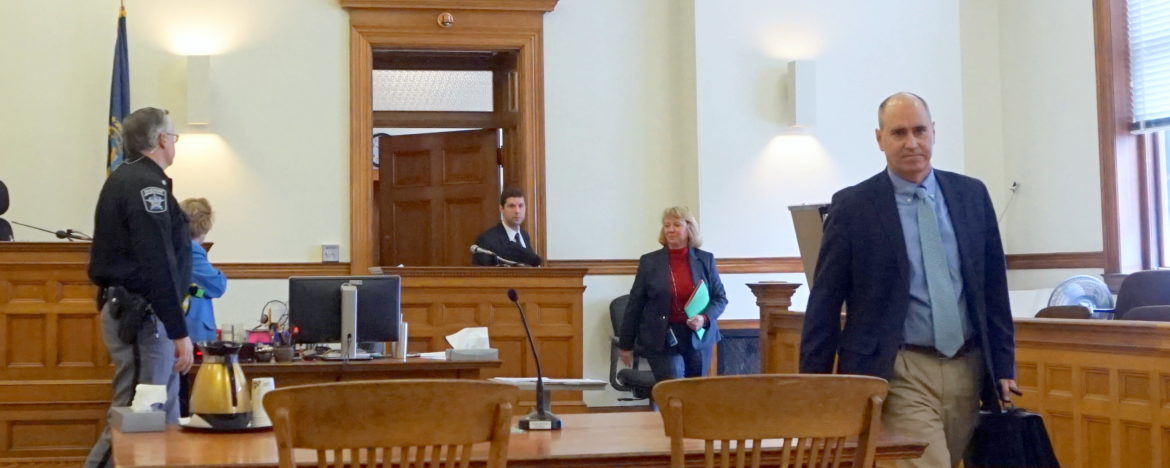CONCORD — Merrimack County Superior Court Judge Diane M. Nicolosi kept the public in the dark on a three-year-old right-to-know case Wednesday by holding the hearing in her chambers out of earshot of one reporter in an otherwise nearly empty courtroom.
Nicolosi held the hearing before this one in the case of Tom Reid v. Attorney General Joseph Foster as a bench conference, also out of earshot.
Reid has been fighting for three years to get the unredacted investigation Foster conducted before temporarily removing then-Rockingham County Attorney Jim Reams from his elected position on Nov. 6, 2013.

Attorney General Joseph Foster
Reid was Reams’ deputy county attorney at the time and was also suspended, but was never under investigation. Reid resigned, practices law in Concord and is determined to find out what evidence Foster had when he removed Reams, who was later reinstated and then retired.
Reid insists the public has a right to know if Foster unjustly smeared Reams’ reputation and removed him in an action Judge Richard McNamara later called “unlawful.” Foster, a Democrat appointed by Sen. Maggie Hassan when she was governor, leaves office tomorrow, March 31, when his term ends.
Associate Attorney General Anne Edwards has been arguing against releasing the names of the people interviewed before Reams’ removal even though McNamara early on ordered the names of the key complainants to be unredacted from the original Motion for Removal.
Four of the names of the women who had worked as prosecutors for Reams were mentioned in open court during a previous hearing before Nicolosi and published by InDepthNH.org.
Assistant Attorney General Frank Francis had argued in a motion to seal the transcripts and explanation of Nicolosi’s in-camera review of the redacted documents that all of the names of the interviewees should now be redacted.
“The OAG realized, based on news coverage after the Jan. 27 hearing, that using individuals’ names at all, such as identifying two of the individuals whose transcripts would be submitted to the court as part of the in camera review, potentially harms those individuals,” Fredericks wrote.
Fredericks didn’t say how the individuals would be potentially harmed.
“Consequently the OAG has selected four transcripts to produce to the court with no publicly available information regarding the identities of the interviewees,” he wrote.
Leaving the hearing on Wednesday, Edwards said she will be turning over documents to Reid under seal. Nicolosi scheduled another hearing for April 18, she said.
“We had a discussion with the judge on how she would like us to proceed,” Edwards said.
Judges have wide latitude when it comes to bench conferences and discussions in chambers.
“(Reid’s) going to be able to consider the redactions we are proposing,” Edwards said.
Foster had originally accused Jim Reams of an ethical violation, financial mismanagement, and gender discrimination. Foster called in the FBI to help with the investigation and used a grand jury to subpoena reluctant witnesses, but ultimately found no criminal wrongdoing.
Judge McNamara ordered Reams back to work five months after his removal when the state said it would not file criminal charges. Reams retired June 14, 2014, with pay through the end of the year. Foster later approved a $30,000 payment to Reams and his lawyer.
Nicolosi is new to Reid’s right-to-know lawsuit since the state Supreme Court remanded it back to Superior Court for further action in December.
Reid had filed that appeal after Merrimack County Superior Court Judge Larry Smukler allowed Foster’s original redactions to stand. Many of the 7,399 pages in the Reams investigation were partially or totally blacked out.
Smukler had allowed many of the redactions as personnel exemptions under the state’s right-to-know law, RSA 91 a, although the state had told Judge McNamara it was a criminal investigation.
Justice Robert Lynn explained the Supreme Court’s reasoning for remanding the case: “Fundamentally, (Reid’s) argument is that records of (Foster’s) investigation of Reams do not ‘pertain to internal personnel practices,’ because ‘the Attorney General is simply not the County Attorney’s employer,’” Lynn wrote.
InDepthNH.org also received the heavily redacted investigation after filing a right-to-know request, but did not appeal. The nonprofit news outlet did recently file a motion to intervene in the current case, but Nicolosi denied the motion.
Reid said after Wednesday’s hearing that Judge Nicolosi said the names of the people interviewed in Foster’s investigation will be redacted.
“At this point – over my objection – the judge decided to redact the names,” Reid said. He asked Nicolosi to make sure there will be a way to cross-reference the names with previous documents to be able to determine the identity of the interviewees.
Reid said from information he has gleaned so far, Foster didn’t check at least some of the claims made by one complainant that Reams had gotten her fired from a job after she left the county attorney’s office.
Investigators never checked with the employer to see if she had been fired because of Reams, or even if she had been fired at all, Reid said.
“That was just an allegation from the employee and the attorney general advanced it without verifying it,” Reid said.
Judge To Decide Which Documents To Release in AG’s Investigation of Reams





